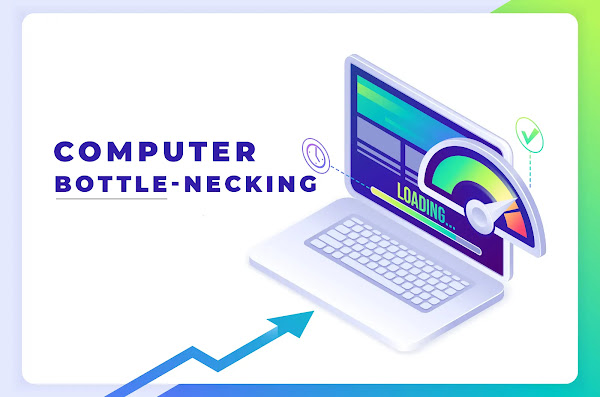A bottleneck in computer systems refers to a situation where a particular component or process in a computer system limits the performance of the entire system. A bottleneck can be caused by a variety of factors such as hardware limitations, software limitations, or a combination of both. In this article, we will explore the concept of bottleneck in computer systems in detail, including its causes, effects, and methods for resolving bottlenecks.
What is a Bottleneck?
A bottleneck in a computer system is a process, component, or resource that limits the overall performance of the system. The term “bottleneck” is used because this component or process restricts the flow of data and processing power, just like a bottleneck in a bottle restricts the flow of liquid. When a bottleneck occurs, the rest of the system is forced to wait for the slow component or process, leading to a decrease in overall performance.
Causes of Bottlenecks
There are several factors that can cause bottlenecks in computer systems, including hardware limitations, software limitations, and a combination of both. Some of the common causes of bottlenecks include:
- Hard Disk Drive (HDD) Limitations: An HDD is a mechanical device that stores data and has a limited read/write speed. When an HDD is slow, it can cause a bottleneck in the system, as the other components are forced to wait for data to be read or written to the disk.
- Central Processing Unit (CPU) Limitations: The CPU is the heart of a computer and performs all of the calculations required to run programs and applications. When the CPU is overworked or slow, it can cause a bottleneck in the system, as other components are forced to wait for the CPU to complete its tasks.
- Graphics Processing Unit (GPU) Limitations: The GPU is responsible for rendering images and video in a computer. When the GPU is slow or does not have enough memory, it can cause a bottleneck in the system, leading to a decrease in performance when playing video games or rendering video.
- RAM Limitations: Random Access Memory (RAM) is a type of memory used by the computer to store data temporarily while programs are running. When the RAM is full, the computer is forced to use virtual memory, which is stored on the hard disk. This can cause a bottleneck, as accessing data from the hard disk is much slower than accessing data from RAM.
- Network Bandwidth Limitations: The speed at which data can be transmitted over a network is limited by the network's bandwidth. When the network is congested or has a low bandwidth, it can cause a bottleneck in the system, as data transfer speeds are slowed down.
Effects of Bottlenecks
The effects of bottlenecks can vary depending on the cause and severity of the bottleneck, but in general, bottlenecks lead to decreased performance and a slower user experience. Some of the common effects of bottlenecks include:
- Slow Program Loading: When a bottleneck occurs, programs and applications may take longer to load and run, leading to a slower user experience.
- Poor Gaming Performance: When the GPU is slow or has limited memory, it can cause decreased performance when playing video games, leading to slow frame rates, choppy graphics, and other issues.
- Slow File Transfer Speeds: When the network bandwidth is limited, file transfer speeds can be slowed down, making it take longer to transfer large files.
- Slow Video and Image Rendering: When the GPU is slow or has limited memory, it can cause decreased performance when rendering video or images, leading to slow rendering times and poor-quality output.
How to prevent bottleneck?
Preventing bottlenecks in computer systems requires identifying and addressing the root cause of the bottleneck. Here are some steps you can follow to prevent bottlenecks in your computer:
- Upgrade Hardware: If your computer's hardware is the cause of the bottleneck, upgrading the affected component can help improve performance. For example, if your HDD is slow, upgrading to a solid-state drive (SSD) can significantly improve read/write speeds and prevent bottlenecks.
- Add More RAM: If your computer's RAM is limiting performance, adding more RAM can help prevent bottlenecks. This is because more RAM allows the computer to store more data temporarily, reducing the need to use virtual memory.
- Upgrade the GPU:If your GPU is causing a bottleneck, upgrading to a more powerful GPU can improve performance when playing video games or rendering video.
- Optimize Software: Software can also cause bottlenecks in computer systems. To prevent software bottlenecks, make sure you are using the latest version of your operating system and any other software you use regularly. Additionally, you can try optimizing your software settings or disabling any unnecessary features or plugins to improve performance.
- Monitor Resource Usage: Regularly monitoring your computer's resource usage can help you identify bottlenecks and address them before they become a problem. There are several tools available, such as Windows Task Manager or third-party performance monitoring software, that can help you monitor your computer's resources.
- Upgrade Network Bandwidth: If your network bandwidth is causing a bottleneck, upgrading your network connection to a faster speed can help prevent bottlenecks and improve data transfer speeds.
By following these steps and regularly monitoring your computer's resource usage, you can prevent bottlenecks and improve the overall performance of your computer system.

